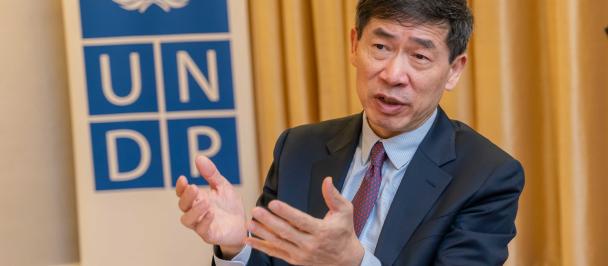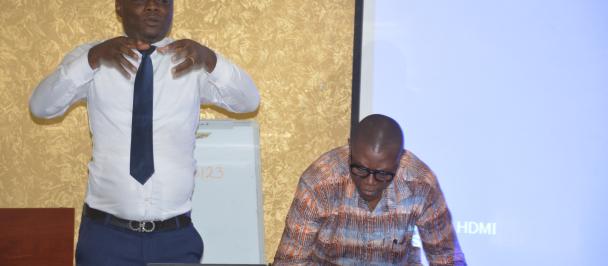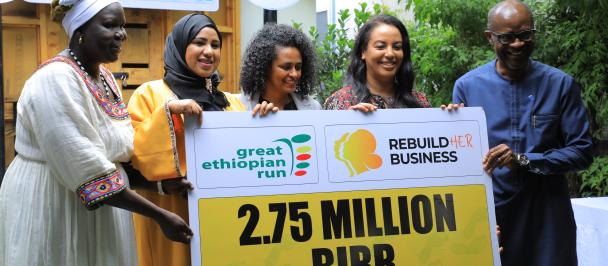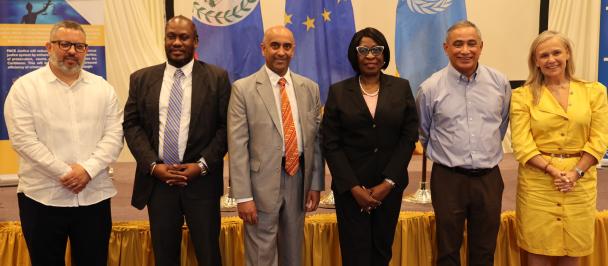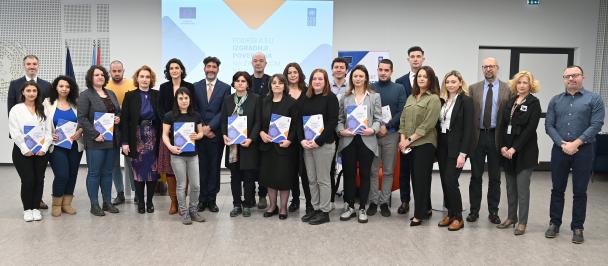Strengthening peacebuilding efforts across Africa key to achieving inclusive, sustainable development
June 11, 2022
UNDP Assistant Administrator and Regional Director for Africa Ms. Ahunna Eziakonwa noted that Africa is at a critical turning point.
Addressing the root causes of evolving conflict and violent extremism leading to terrorism in Africa is critical to achieving the United Nations Sustainable Development Goals (SDGs) and the African Union’s Agenda 2063, according to panellists at a high-level side-event held on 31 March.
Co-organized by the Institute of Security Studies – Africa and UNDP, the event took place on the margins of a Ministerial Meeting held in preparation for the upcoming 8th Tokyo International Conference on African Development (TICAD), scheduled for August 2022.
Participants highlighted that ongoing efforts to achieve inclusive and sustainable socio-economic development in Africa – a cornerstone of Agenda 2063 – are hampered by multidimensional governance and security challenges. The current governance landscape on the continent has recently witnessed a resurgence of military interventions in politics that have led to unconstitutional changes of government in several countries.
This, panellists agreed, has created political uncertainty and undermined democratic stability in the affected countries. Transnational organised crime has also benefited from conflicts and instability. Meanwhile, climate pressures and the impact of the COVID-19 pandemic on livelihoods have exacerbated existing tensions and at times been threat multipliers to violent conflicts in communities.
UNDP Assistant Administrator and Regional Director for Africa Ms. Ahunna Eziakonwa noted that Africa is at a critical turning point as a result of these concerns.
“Conflict remains a challenge with renewed threats of violent extremism and an increase in military coups. Climate change is also creating new forms of displacement and threatens to derail development progress, while COVID-19 has created risks of increased inequality and possible long-term socio-economic reversals,” she said.
However, Ms. Eziakonwa highlighted that UNDP is acutely aware of the growing opportunities on the continent. This includes its young, dynamic and talented population, the advantages of the Fourth Industrial Revolution and the emergence of the African Continental Free Trade Area, which opens new avenues for regional integration.
“UNDP’s partnership with the government of Japan is about creating a space for a new partnership that puts African people and institutions in the driver’s seat in the pursuance of development goals to realize human security for all,” she said, adding that constructive partnerships are needed to transform Africa’s peace and development landscape.
Mr. Jun Shimmi, Ambassador Extraordinary and Plenipotentiary for TICAD in Japan’s Ministry of Foreign Affairs, reminded panellists that the TICAD platform was originally a forum to discuss, enhance and materialise African development.
“And yet, the more we proceed with the TICAD process, the more we come to realise that without sustainable peace and stability, there can be no further development in Africa. Addressing the root causes of conflict and terrorism, as well as other pressing concerns, is indispensable for regional stability,” he said.
Mr. Shimmi added that strengthening the foundation of local communities, engaging youth and women in conflict-prevention and resolution and enhancing the humanitarian development peace nexus are also essential.
During the keynote presentation, the Executive Director of the Institute for Security Studies Dr. Fonteh Akum returned to the triple threat of the COVID-19 pandemic, violent conflict and governance instability as obstacles to the improvement of social and economic conditions in Africa.
“As vulnerability accelerators, their correlates exacerbate horizontal and vertical inequalities, and cast a dark pall of uncertainty over future trends and scenarios that point to the attainment of the Sustainable Development Goals by 2030 remaining ever more elusive,” he said.
He added that there is a need to think bigger about partnerships around technology, innovation, science and technology. The operationalisation of a whole-of-society approach to problem solving in peace, governance and development would promote inclusiveness, social cohesion and effective problem solving.
Ambassador Fred Ngoga Gateretse, Head of the Conflict Prevention and Early Warning Division in the African Union Commission (AU), said successful implementation and continuation of programmes to improve social and economic conditions in Africa involves about 90% political engagement.
“Partnerships are also important. When you are in the process of bringing about peace in a country, it is important to have really strong and solid partnerships that are well-coordinated,” he underscored.
He explained that countries experiencing political strife or conflict were often resistant to external interference and therefore organisations needed to be creative and tackle it from a governance perspective. “For instance, if you want to help a member state strengthen its institutions, so they’re able to respond better, they’re likely to pay more attention. But if you touch on issues relating to changes to their constitution or term limits, they will resist.”
In this connection, panel members echoed that stakeholders and practitioners have to be sensitive, equipped with humility and deep understanding on the local context.
The Regional Peacebuilding Advisor at UNDP’s Service Centre for Africa, Ms. Nirina Kiplagat agreed, noting that, “Peacebuilding and conflict prevention needs to be fully integrated within governance and within development. We have seen that in peace agreements, those that only deal with the cessation of violence, without looking at the underlying causes, tend to have a relapse into conflict.”
She further underscored understanding the complexity of factors that lead to violent extremism is crucial, and will help shape nuanced gendered developmental responses addressing the root causes that make communities and especially women and youth vulnerable. “For example, in the Sahel, UNDP has a youth eco-brigade, which is part of the youth offer for that region and has a special emphasis on livelihoods and conflict prevention. It is being implemented in cross-border areas between Niger, Nigeria, Burkina Faso and Mali.”
All speakers reaffirmed that a successful peacebuilding process must be transformative and create space for a wider set of actors, especially women and young people.
Ms. Nagat Suliman Ahmed Osman, SFCG programme officer for Central and East Africa based in Sudan, highlighted that women and youth are not violent or peaceful; they just respond to available options. She added that one of the roles youth and women can play in peacebuilding is to lead change.“There are many opportunities for women and young people in the peacebuilding process. We will not start from point zero as the peace-making process has already started, as there are domestic and regional efforts to integrate more young people in the process,” Ms. Suliman said.
She further pointed out that women and young people have also been treated as beneficiaries and participants in peacebuilding programmes and have not been treated as partners. “Therefore, it is a must to consider them as partners in peacebuilding, democratization and good governance; when we treat them as partners, we will increase their self-confidence in making changes,” she said.
The regional Director for East Africa at the ISS Dr. Paul-Simon Handy pointed out that context matters when addressing violent extremism in various parts of Africa, as it is not a one-size- fits all approach.
“The way one addresses this issue in the Sahel cannot be the same as how it is tackled in East Africa, for example. Sometimes, even within a country, such as Niger, violent extremism will manifest one way in one part of the country, and another way in another part of the same country.”
Dr. Handy noted that deeper understanding of dynamics should also inform policy, and that peace can only be achieved by understanding what drives insecurity and instability. He urged partners to opt for conflict prevention interventions instead conflict management strategies.
“While the latter is more attractive since it yields visible results and credit, more resources and focus should be directed towards prevention, as it is essential in setting up a pathway towards attaining peace, security and development,” he said.
In this connection, panel members agreed to the need for establishment of measurement indicators for peace not only in negative terms but with positive indicators, as well as to support peacebuilding architecture at the national and local levels for conflict early warning and response. The panellists also noted the challenges around early response particularly at national levels.
The ripple effects of the pandemic and violent extremism continue to generate social tensions, agitations and protests that undermine social cohesion and stability of states. Nevertheless, panellists agreed that the current challenges present an opportunity to reinvent responses to governance, peace, security and development facing African countries with out-of-box approaches and innovations.
Building long-lasting peace and stability in Africa will be among the key agenda at the upcoming TICAD 8 on 27-28 August 2022.
To watch the proceedings: (237) TICAD閣僚会合 ハイレベル・サイドイベント「アフリカにおける平和、ガバナンス、開発」【英語】 - YouTube

 Locations
Locations